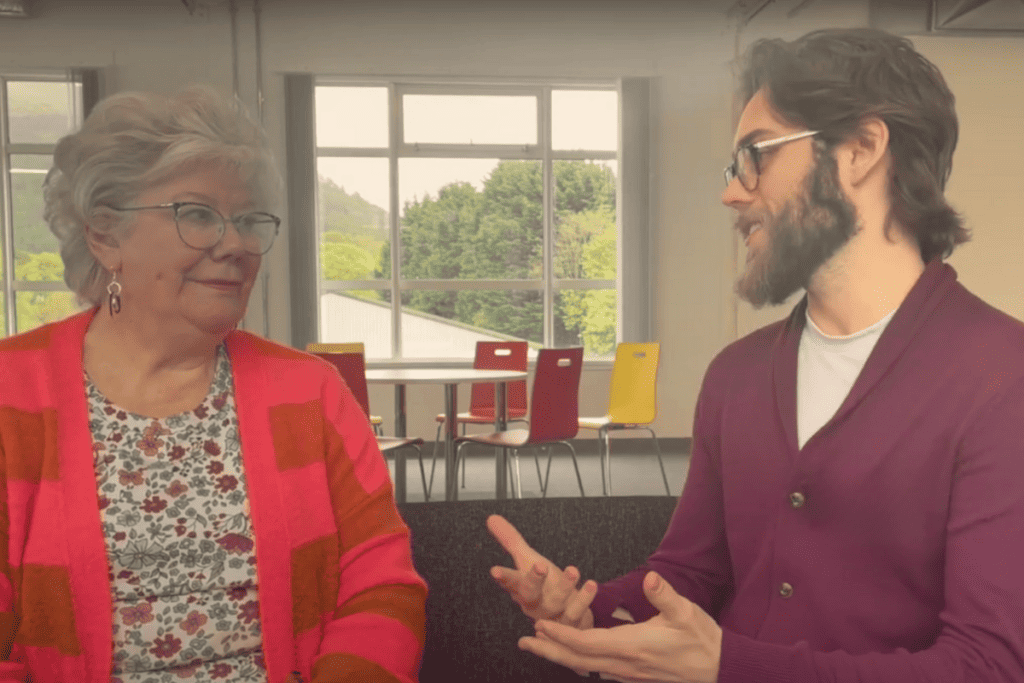One Piece of Advice to Transform Conversations with People with Dementia

Author: Faith in Later Life
Note: The following blog post is based on an interview conducted by Adsum Try Ravenhill at the Faith in the Second Half conference with Louise Morse, a renowned speaker on dementia care. You can watch that interview below.
Last week, I had the privilege of attending the Faith in the Second Half conference, where I had the opportunity to listen to Louise Morse’s captivating talk on dementia. There was one particular concept Louise shared that I found truly enlightening and wanted to share with all of you. In the original interview—and now in this blog post—I want to delve into that concept and its significance in dementia care.
During her talk, Louise touched upon the idea of “not correcting but deflecting” when communicating with individuals living with dementia. This approach is gaining recognition as an effective way to foster understanding and connection with those affected by the condition. I had a chance to chat with Louise about this concept, and she graciously shed light on its importance.
Louise explained that people with dementia often make obvious mistakes in their statements, such as expressing a desire to go home while already being in their own home. However, these statements are not always about the physical place but rather the feeling of not being at home. Dementia impairs a person’s ability to communicate concisely, making it crucial not to correct them. Correcting individuals with dementia can elicit fear and confusion, much like if someone were to tell you and me that we were conversing in the middle of an airport. Their reality, shaped by the impact of brain damage, becomes their truth. Therefore, instead of correcting, the approach is to deflect.
Louise shared a heartwarming example that perfectly illustrates the power of deflection. She recounted the story of her friend, an elderly pastor living with dementia, who has a passion for tennis. He had been following Emma Raducanu’s matches and empathised with her when she faced defeat. He sincerely believed that Emma had visited him in Monmouth and that he had offered her words of encouragement. His wife, who had a background in teaching and correcting, recognised the futility of such correction and responded by saying, “The thing I love about you is the way you always encourage people.” This response encouraged him. It was evident that the authenticity of his expression was more important than the factual accuracy of his claims.
The key to effective deflection, as Louise emphasised, lies in providing positive and uplifting responses. The goal of dementia care is to maintain the person’s sense of well-being and contentment. If those with dementia could think clearly and logically, they wouldn’t be ill—they would be healthy. Therefore, it becomes our responsibility to hold them in a state of encouragement, just as God encourages us to do with one another as the Church. Building one another up is a fundamental aspect of care that dementia teaches us to embrace fully.
It is crucial to recognise that this concept of deflection is applicable not only to professional caregivers but to anyone who interacts with individuals living with dementia. Whether we are family members, friends, or simply encounter someone affected by the condition, we all have the opportunity to create meaningful connections through understanding and compassion.
A huge thanks to Louise Morse for sharing her insights and wisdom on dementia care during the conference and for taking the time to speak with us about this essential topic. To all our readers, I hope you find inspiration in Louise’s words and consider how you can implement the principle of deflection in your own interactions with individuals living with dementia.
Whether you are reading this from the comfort of your home or in a professional caregiving capacity, may you have a wonderful day filled with compassion, understanding, and a deep appreciation for the importance of dementia care.
